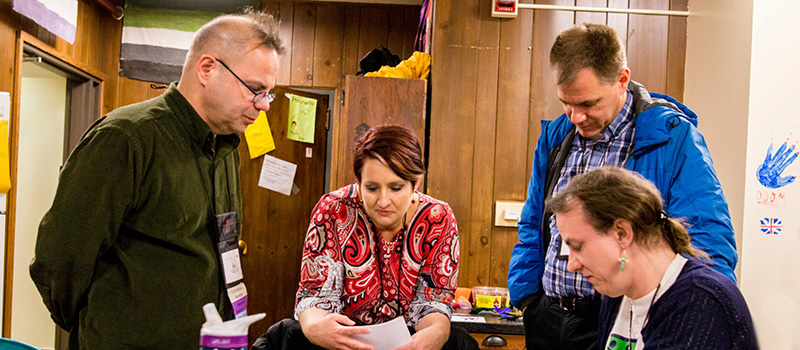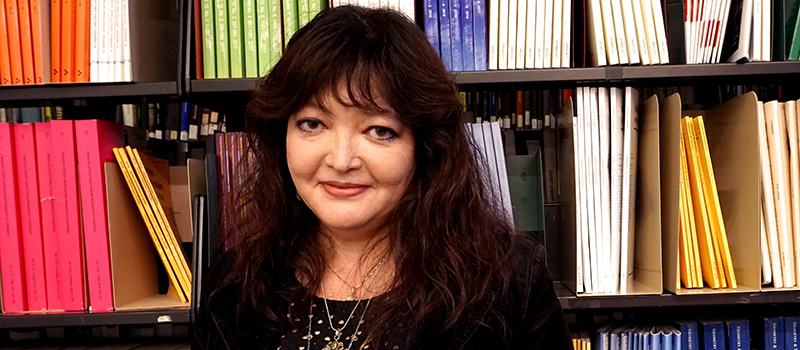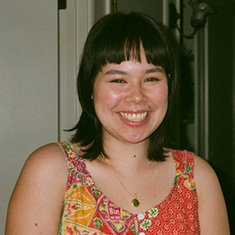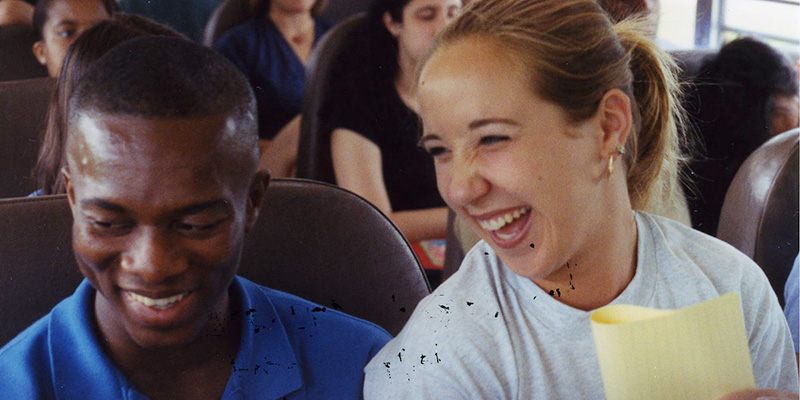Grinnell’s multicultural student history documented in online archive
October 19, 2023 — In a fascinating oral history recorded in June 2012, life trustee Ronald Gault ’62 recounted his decades-old experiences as a student at Grinnell.
He recalls being one of just five or six Black students out of nearly 1,000 Grinnellians on campus. He talks about the attitudes of people in town and in the classroom, and why he came from DuSable High School on Chicago’s South Side to the College, “where if you’re a serious student, I think you can do well and the results will be reflected in the careers that you choose and the life that you lead.”
 Chris Wilde ’88, left, shown here during a 2017 Multicultural Reunion event at Stonewall Resource Center, documented much of the LGBTQIA+ history for the archive.
Chris Wilde ’88, left, shown here during a 2017 Multicultural Reunion event at Stonewall Resource Center, documented much of the LGBTQIA+ history for the archive.
Gault’s oral history is one of many historical stories – along with dozens of photos, timelines, and biographies – that make up the growing Grinnell College Multicultural Alumni Archive. It’s a long-term project involving students, alumni, and College archivists that documents student life and organizations serving students of diverse cultural backgrounds, including both international students and domestic students of color; students of various faiths; students with disabilities; first-generation and low-income students; and LGBTQIA+ students, among others.
The archive will be the subject of a panel discussion at November’s Multicultural Reunion.
Student organizations, with the help of alumni, will choose alumni to feature and tell their story, which will then become part of the archives. The session, titled “Undiscovered Grinnell: Illuminating Multicultural Stories,” will take place at 4 p.m. Friday, Nov. 10 in the Humanities and Social Studies Center (HSSC) Room S2310.
Launched in 2019, the archives is the brainchild of Kathi Matsuura ’90, a Harvard librarian who splits her time between Japan and the U.S., and Chris Wilde ’88, co-founder of The Queer Zine Archive Project, who has documented much of the LGBTQIA+ history. The archives are coordinated by Sarah Smith-Benanti, assistant director of alumni and donor relations, diverse communities, and Chris Jones, associate professor and archivist of the College.
 Kathi Matsuura ’90, a Harvard librarian, helped launch the Multicultural Alumni Archive and researched content for the site.
Kathi Matsuura ’90, a Harvard librarian, helped launch the Multicultural Alumni Archive and researched content for the site.
“Chris Wilde and I talked about all these different groups on campus for Black, Latin American, Asian American, LGBTQ and other students, and that many current students didn’t seem to know the histories of these groups, how they’d been formed, and the different names they once had,” Matsuura says. “So, we talked about creating an archive and it went from there. With all these groups we felt we could do something interesting and important with alumni and students together.”
Timelines of Grinnell’s multicultural history were created and digitally displayed during the 2019 Multicultural Reunion. After the decision was made to switch the 2021 Multicultural Reunion to a virtual format, Claire Burns ’23 came aboard as a Vivero fellow to create the archives website.
 Claire Burns ’23
Claire Burns ’23
Vivero is a College organization for students to gain experience working on digital humanities projects. Burns created and designed the site – which was envisioned as digital yearbook with timelines and links to Digital Grinnell – and maintained it for three semesters at Grinnell, while continuing to add content.
“The idea was to get as much media and data from as many groups as we could find because we were starting from nothing,” Burns says. “We explored the Grinnell archives and reached out to Intercultural Affairs to gather alumni donations of old photos. I knew there was so much content out there and so much material in the hands of alumni in their private collections.”
For Matsuura, whose daughters Reina ’19 and Kaya ’23 were educated in the U.S. and Japan, the archives are incredibly important. Reina also works on the archive. “It’s very hard for these memories to be passed on, so this is an attempt to codify and make sure that these memories remain, and that people have a place to see them,” Kathi says. “I’m also interested in not so much the Grinnell of my past, but the Grinnell of my future and making sure that it’s a place where everyone feels that they belong.”
Burns, who served on the cabinet of Grinnell’s Asian-American Association, says she found a lot of value in learning about the history of affinity groups, how and why they formed, and the idea of coalition building at the College.
 Kwame Nti-Addaz ’02, left, and Marina Alvidrez '01 share a laugh on a bus trip to Iowa City in this 1999 archive photo.
Kwame Nti-Addaz ’02, left, and Marina Alvidrez '01 share a laugh on a bus trip to Iowa City in this 1999 archive photo.
“It was very inspirational to learn there was so much self-organizing happening in the past both within and across affinity groups,” she says. “I think it’s a great source of inspiration for current students, to improve our intercultural relationships and look at how we can be engaged in building more community with other affinity groups.”
For alumni, Burns says it’s important to provide their stories and perspective to build the narrative.
“This is a way to connect multicultural alumni with each other, too,” she says.
— by Anne Stein ’84